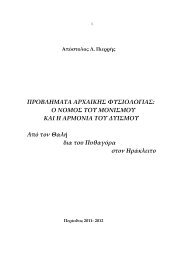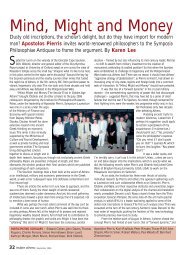Commentary on the Beginning of Damascius' De Primis Principiis
Commentary on the Beginning of Damascius' De Primis Principiis
Commentary on the Beginning of Damascius' De Primis Principiis
You also want an ePaper? Increase the reach of your titles
YUMPU automatically turns print PDFs into web optimized ePapers that Google loves.
10separate <strong>the</strong>m. Basically, as Aristotle says [20], it was this: if <strong>the</strong> very nature <strong>of</strong> <strong>the</strong>Good c<strong>on</strong>sists in <strong>the</strong> One, <strong>the</strong>n <strong>the</strong> principle opposite to <strong>the</strong> One, namely <strong>the</strong>Multiplicity, must be <strong>the</strong> Evil; but Speusippus denied that <strong>the</strong>re can be evil, indeed<strong>the</strong> Evil, in <strong>the</strong> absolutely first principles. So he made <strong>the</strong> Good and <strong>the</strong> Evil to lie at<strong>the</strong> completi<strong>on</strong> <strong>of</strong> <strong>the</strong> derivati<strong>on</strong> <strong>of</strong> reality ra<strong>the</strong>r than at <strong>the</strong> beginning (like in <strong>the</strong>fully developed animal ra<strong>the</strong>r than at <strong>the</strong> seed and sperm) – to use <strong>the</strong> metaphorSpeusippus himself may have employed [21].We know, <strong>of</strong> course, from Aristotle (and Theophrastus ’ little metaphysicaltract), even if we could not see it already right in Plato’s dialogues, that ascending t<strong>of</strong>irst principles from <strong>the</strong> given via <strong>the</strong> presuppos iti<strong>on</strong>-ladder, and descending from<strong>the</strong>m in a derivati<strong>on</strong> attempt which aims at covering all reality and locatingeverything real at its appropriate place in <strong>the</strong> total Order <strong>of</strong> <strong>the</strong> Universe <strong>of</strong>Subsistence in general – that <strong>the</strong>se procedures were <strong>the</strong> preoccupat i<strong>on</strong> <strong>of</strong> <strong>the</strong> olderAcademy and <strong>of</strong> c<strong>on</strong>temporaneous Pythagorean circles. But how is this specificallyc<strong>on</strong>nected with our particular passage in D.?In fact <strong>the</strong>re were those, who denied any direct c<strong>on</strong>necti<strong>on</strong>, and accused D. <strong>of</strong>misunderstanding. Admirably enough <strong>the</strong>y even pointed at a passage in Aristotle,which, <strong>the</strong>y claimed, was misunderstood by D. [22]. The passage is in Met. N.1087b.25-33 (esp. b32, see also N. 1087b4-9), where admittedly <strong>the</strong> clause ἔσται γὰρ τὸ ἓν ὀλίγον matches well, in all externals, D.’s clause: οὐ γὰρ ἓν ὣς ἐλάχιστον.But in fact we have here just that kind <strong>of</strong> superficial interpretati<strong>on</strong> which marsso much in modern attempts at understanding ancient philosophy in general, andGreek Metaphysics in particular, and most especially Neoplat<strong>on</strong>ism. To see this clearlyin <strong>the</strong> present instance <strong>on</strong>e should firstly notice <strong>the</strong> extreme frivolity <strong>of</strong> Aristotle ’spoint here [23]. The argument is this: Some philosophers claim that a pair <strong>of</strong>c<strong>on</strong>traries ( ἐνάντια) are <strong>the</strong> ultimate principles <strong>of</strong> all reality. Som e (notablySpeusippus) maintain that this fundamental pair is <strong>the</strong> One and <strong>the</strong> πλῆθος. But <strong>the</strong>c<strong>on</strong>trary to Many is <strong>the</strong> Few (drawing <strong>on</strong> <strong>the</strong> ordinary-language oppositi<strong>on</strong> between<strong>the</strong> few and <strong>the</strong> many). Hence <strong>the</strong>ir One must be <strong>the</strong> Few. As if <strong>on</strong>e who wouldpropound <strong>the</strong> view c<strong>on</strong>cerning <strong>the</strong> ultimate nature <strong>of</strong> <strong>the</strong> c<strong>on</strong>trariety between Oneand Πλῆθος, could possibly mean by Πλῆθος <strong>the</strong> Many, instead <strong>of</strong> <strong>the</strong> obviouslyintended Multiplicity, whe<strong>the</strong>r large or small.










